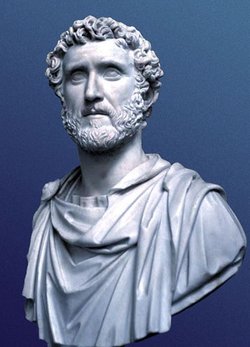Antoninus Pius
|
|
Titus Aurelius Fulvius Boionius Arrius Antoninus Pius (September 19, 86 - March 7, 161) was Roman emperor from 138 to 161.
He was the son of Aurelius Fulvus, a Roman consul whose family came from Nemausus (Nîmes). Antoninus Pius was born near Lanuvium. After the death of his father, he was brought up under the care of Arrius Antoninus, his maternal grandfather, and a friend of Pliny the Younger.
Having discharged the offices of quaestor and praetor, and twice served as consul, Antoninus was appointed by the emperor Hadrian as one of the four ex-consuls to administer Italy, then greatly increased his reputation by his conduct as proconsul of Asia. He acquired much favor with the emperor Hadrian, who adopted him as his son and successor February 25, 138, after the death of his first adopted son Aelius Verus, on the condition that he would adopt Marcus Annius Verus, the son of his wife's brother, and Lucius, son of Aelius Verus, who afterward became the emperors Marcus Aurelius and Lucius Aelius Verus.
Antoninus in many ways was the ideal of the landed gentleman praised not only by ancient Romans like Varro and Cato the Elder, but later scholars of classical history, such as Edward Gibbon or the author of the article on Antoninus Pius in the ninth edition of the Encyclopedia Britannica:
- A few months afterwards, on Hadrian's death, he was enthusiastically welcomed to the throne by the Roman people, who, for once, were not disappointed in their anticipation of a happy reign. For Antoninus came to his new office with simple tastes, kindly disposition, extensive experience, a well-trained intelligence and the sincerest desire for the welfare of his subjects. Instead of plundering to support his prodigality, he emptied his private treasury to assist distressed provinces and cities, and everywhere exercised rigid economy (hence the nickname "cummin-splitter"). Instead of exaggerating into treason whatever was susceptible of unfavorable interpretation, he spurned the very conspiracies that were formed against him into opportunities of signalizing his clemency. Instead of stirring up persecution against the Christians, he extended to them the strong hand of his protection throughout the empire. Rather than give occasion to that oppression which he regarded as inseparable from an emperor's progress through his dominions, he was content to spend all the years of his reign in Rome, or its neighborhood.
His reign was comparatively uneventful in comparison to those before and after his; the surviving evidence is not complete enough to determine whether we should interpret, with older scholars, that he wisely curtailed the activities of the Roman Empire to a careful minimum, or perhaps that he was uninterested in events away from Rome and Italy and his inaction contributed to the pressing troubles that faced not only Marcus Aurelius but also the emperors of the third century.
RomaForoRomanoTempioAntoninoFaustina.JPG
One of his first acts as Emperor was to persuade the senate to grant divine honors to Hadrian, which they had at first refused; his efforts to persuade the Senate to grant these honors is one of the reasons given for his title of Pius (dutiful in affection; compare pietas). Two other reasons for this title are that he would support his aged father-in-law with his hand at Senate meetings, and that he had saved from death those men that Hadrian, during his period of ill-health, had condemned to death. He built temples, theatres, and mausoleums, promoted the arts and sciences, and bestowed honors and salaries upon the teachers of rhetoric and philosophy.
There were several military disturbances throughout the Empire in his time, in Mauretania, Iudaea, and amongst the Brigantes in Britain, but none of them are considered serious. The unrest in Britain is believed to have led to the construction of the Antonine Wall from the Firth of Forth to the Firth of Clyde.
By his wife Faustina the Elder he had two sons and two daughters, but all died before his elevation to the throne -- except Faustina the Younger, who became the wife of Marcus Aurelius. On her death in the third year of his reign, he honored her memory by the foundation of a charity for orphan girls, following the practice of prior emperors in endowing an Alimentaria to promote the welfare of children and an increased population.
Antoninus died of fever at Lorium in Etruria, about 12 miles from Rome, on March 7, 161, giving the keynote to his life in the last word that he uttered when the tribune of the night-watch came to ask the password -- "Equanimity".
The only account of his life handed down to us is one of the Scriptores Historiae Augustae.
Contacts with China
The Hou Hanshu (History of the Later Han Chinese dynasty) recounted the first of several Roman embassies to China set out by emperor Antoninus Pius. The mission came from the South, and therefore probably by sea, entering China by the frontier of Jinan or Tonkin, bringing presents of rhinoceros horns, ivory, and tortoise shell which had probably been acquired in Southern Asia.
The emperor was probably actually Marcus Aurelius, who was the reigning emperor. Antoninus Pius died in AD 161, while the convoy arrived in AD 166. The confusion arises because Marcus Aurelius took as additional names, those of his predecessor as a mark of respect. He is referred to in Chinese history as "An Tun" (= Antoninus), hence the confusion.
The mission reached the Chinese capital Luoyang in 166 and was greeted by Emperor Huan of the Han Dynasty. About the same time, and possibly through this embassy, the Chinese acquired a treatise of astronomy from Daqin (Rome).

